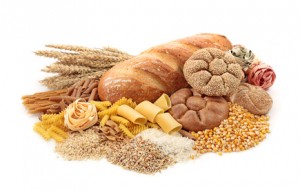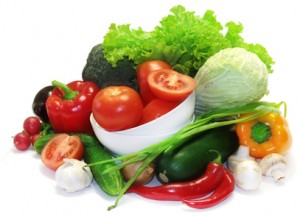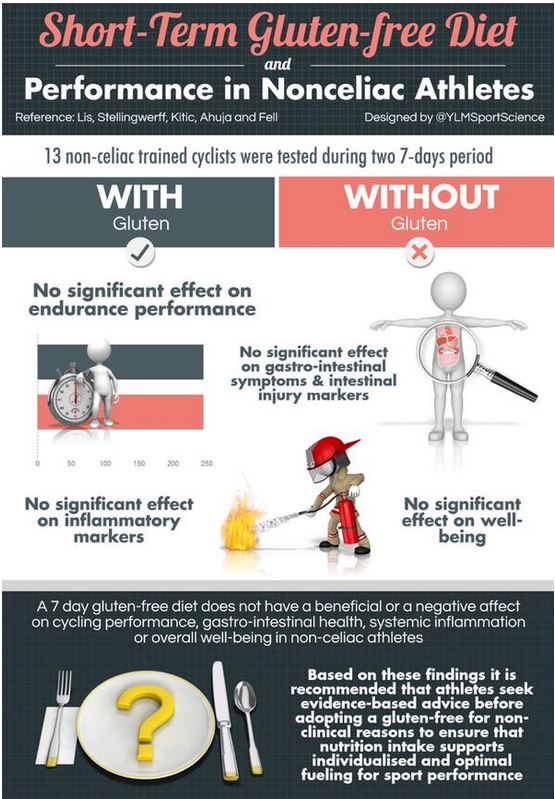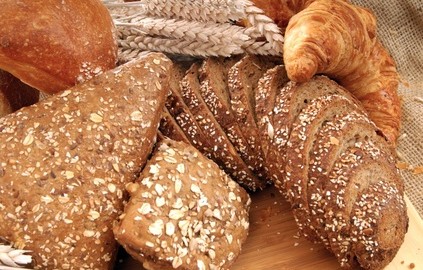 The gluten-free trend is a popular one, and many athletes have hopped on the bandwagon thinking it might improve their health, digestion, and athletic performance. People with celiac disease (about 1% of the population) need to absolutely avoid gluten because it damages their intestines; others believe they are “gluten sensitive,” which is a debatable condition that recent studies have called into question.
The gluten-free trend is a popular one, and many athletes have hopped on the bandwagon thinking it might improve their health, digestion, and athletic performance. People with celiac disease (about 1% of the population) need to absolutely avoid gluten because it damages their intestines; others believe they are “gluten sensitive,” which is a debatable condition that recent studies have called into question.
A new study reveals that about 40% of of athletes without celiac disease have diagnosed themselves as “gluten sensitive” and try to follow a gluten-free diet. Although many people report feeling better without gluten, evidence shows this is likely the result of people paying more attention to their overall diet, a strong placebo effect, or choosing healthier options (for example, eating an orange instead of a bagel provides many more nutrients and fewer calories – a healthful substitution for many, but that doesn’t mean you need to avoid bagels altogether . . . ).
A gluten-free diet can be quite healthy

People who adopt a gluten-free diet often discover a variety of other healthy grains. Also, someone who adopts a gluten or grain-free diet could be eating better than their previous diet if they are replacing grains with more nutritious food choices. Most of these diets recommend limiting processed foods and refined carbohydrates and eating more fruits and vegetables, habits that can improve diet and health tremendously.
If a person notices health benefits after eliminating gluten or wheat, they will attribute the benefit to going gluten/grain/wheat free. But it’s almost impossible to attribute any benefits to the absence of a specific grain or gluten, since so many other dietary variables change with this elimination (overall calories, ratio of fat/carbohydrates/protein, fiber intake, dietary glycemic index, and intake of many other nutrients not related to a specific food).
Also, when people pay more attention to food labels and to what they are eating, they are more likely to eat better and may lose weight; weight loss can lead to a host of benefits unrelated to gluten/grains/wheat (although most people attribute all benefits to eliminating a food). If you feel better after eliminating gluten, your new healthy habits likely don’t need to be at the expense of limiting a wide array of foods with known health-promoting properties.
But, a gluten-free diet can also be less nutritious
Many gluten-free foods aren’t fortified with iron or folic acid. Also, when manufacturers remove gluten from foods they may add additional sugars, sodium, and unhealthy fats. Many gluten-free products use a refined gluten-free flour that lacks the fiber of other grains. Consumer Reports provides several examples of gluten-free foods that are unhealthier than their gluten-containing counterparts (see their report for specific examples). One preliminary study suggests that a gluten-free diet may decrease the count of beneficial gut bacteria.
Another issue is that some of the most popular anti-gluten books promote low-carbohydrate diets, which can leave endurance athletes short on fuel for their workouts compromise recovery, and suppress their immune system. For example, the diet advocated by “Grain Brain” is low-carbohydrate, high-fat, and high cholesterol, which has raised concern about health among researchers.
Also, this research found that people avoiding grains and gluten are at higher risk for heart disease, and another study suggests that those who consume too many rice-based products and rice may be at risk for harmful levels of arsenic and mercury exposure.
Examine the evidence
While gluten can cause problems in a minority of the population, there is no good evidence that gluten is problematic for most people. Many individuals are getting their information from popular anti-grain or anti-wheat books (e.g., Wheatbelly, Grain Brain), which are not based in good science and have been widely criticized by most academics and nutrition experts (see extra reading, below). For example, here is how McGill’s Joe Schwarcz describes the lack of science behind Wheat Belly:
“But if you are scientific minded, it is worthwhile to read this book just to see how masterfully Davis blends cherry-picked data, inflammatory hyperbole, misused science, irrelevant references and opinion masquerading as fact into a recipe for a cure-all. Some of the “science” is just absurd.”
Are you avoiding gluten to improve your athletic performance?
Some athletes erroneously believe that eliminating gluten from their diet will make them faster or stronger. There is no evidence to support this claim, and the available research shows that gluten doesn’t influence performance. A recent study (illustrated by Yann Le Meur in graphic below) found that a gluten-free diet has no influence on performance (15 km cycling time trial), GI symptoms, well-being, and a other inflammatory markers or indicators of intestinal injury in non-celiac endurance athletes.

Are you avoiding gluten because of stomach issues while you exercise?
You’re not alone. Studies suggest that 30-50% of athletes experience gastrointestinal problems during endurance events. It’s important to recognize that GI issues can be very complex, and although “gluten” is a popular villain, it’s likely not the cause.
Consider my advice on what to eat before working out, and consult this recent review with recommendations for gastrointestinal complaints during exercise.
-
Avoid high-fiber foods in the day before competition or before strenuous workouts (but keep fiber in your regular training diet!).
-
Avoid aspirin and NSAIDs such as ibuprofen.
-
Avoid high-fructose foods (in particular drinks that are exclusively fructose); fructose and glucose combination may be better tolerated.
-
Avoid dehydration, which can make stomach symptoms worse. Start your race (or training) well hydrated.
The authors also recommend ingesting carbohydrates with sufficient water or choosing drinks with lower carbohydrate concentrations. Always experiment with nutrition strategies before race day. (Sports Medicine Online May 2014)
The benefits of whole grains for athletes
Athletes (especially endurance athletes) require more carbohydrates than nonathletes so that they can fuel their muscles for activities. Of course, many other foods besides grains contain carbohydrates (for example fruits and vegetables, especially starchy vegetables), but including grains can help you get a wider range of vitamins and minerals and improve the overall quality and diversity of your diet. Including more fruits and vegetables in your diet is likely a good idea for most people, but it’s probably best if you don’t do it at the exclusion of whole grains. (And if you’re an athlete with high calorie requirements you might have difficulty meeting your carbohydrate needs).
Whole grains are linked with many health benefits including lower risk of heart disease, stroke, improved insulin sensitivity, reduced risk of some cancers, and reduced risk of diabetes. For your everyday diet, it’s best to focus on whole, unprocessed grains.
Bottom Line
There is little evidence that avoiding gluten or wheat will improve your health or athletic performance. In fact, whole grains have many health benefits and gluten-containing grains are an integral component of some of the best-studied and healthiest diets in the World.
More reading about gluten-free diets and health:
- Gluten avoidance and cardiac risks (New England Journal of Medicine, Podcast).
- Long term gluten consumption in adults without celiac disease and risk of coronary heart disease: prospective cohort study (British Medical Journal, 2017; 357)
- Gluten-free foods may not be healthful, study warns (Medical News Today, reporting on 50th Annual Congress of the European Society for Paediatric Gastroenterology Hepatology and Nutrition, 2017)
- You Shouldn’t Go Gluten-Free Unless You Have Celiac Disease, According to a Study (NY Mag, reporting on BMJ 2017;357:j1892)
- Gluten-free diet may increase risk of arsenic, mercury exposure (Science Daily, reporting on The Unintended Consequences of a Gluten-Free Diet. Epidemiology, 2017; 1)
- Gluten-free diet won’t help athletic performance. This study in competitive cyclists used a controlled randomized double-blind, cross-over design to examine the influence of gluten (athletes didn’t know if their 7-day study diet contained gluten or not). Investigators found that a gluten-containing diet did not influence performance (15 km TT), GI symptoms, well-being, and a other inflammatory markers or indicators of intestinal injury in non-celiac endurance athletes. (Med Sci Sports Exerc. 2015 May 12. )
- Gluten sensitivity: new epidemic or new myth? (Nash DT, Slutzky AR. Baylor University. Medical Center; 2014;27(4):377-378.)
- Hidden risks of going gluten free for health (Consumer Reports)
- Against the Grain (Micheal Specter, the New Yorker)
- Gluten free may not improve athletes’ performance (video, study by University of Tasmania, Australia researchers)
- Experts Question Benefits of Gluten-Free for All but a Small Minority (Wall Street Journal)
- Gluten elimination diets: Facts for patients on this food fad (Kathleen Cadenhead, MD, Margo Sweeny, MD, BC Medical Journal)
- Grain Brain – Take It With a Grain of Salt (Axel F. Sigurdsson MD, PhD, FACC).
- Dissecting the Myth: Why Grains and Gluten Aren’t Bad for You
- When a gluten-free diet is *bad* for you (Berkeley Wellness)
- Is gluten-free healthier? (Jill Parnell, PHD)
- The dangers of going gluten free
- Gluten-free diets: who’s spreading the bulldust? (Bill Shrapnel, MHP)
- The facts about gluten and gluten intolerance. (Science-Based Medicine)
- McGill’s Joe Scwarcz reviews Wheat Belly (Joe Schwartz, PhD)
- Is wheat bad for you? Not for most people. (Marion Nestle, MPH, PhD, Food Politics Blog)
- Ignore Grain Brain & Wheat Belly: Eat WHOLE Grains (Dr. Gabe Mirkin)
- Beating on Wheat and Raining on Grains (Dr. David L. Katz)
- Is modern wheat making us sick? (Monica Reinagle, RD)
- Evidence-based review of the popular diet book Wheat Belly (Julie Jones, PhD)
- Does wheat make us fat and sick? (European Food Information Council)
- The 10 best wheat and gluten-free carbohydrate foods if you train a lot (Lisa Middleton, RD)
More Sports Nutrition Articles
- Nutrition Strategies for Health and Athletic Performance
- Dietary Nitrates, Sports Performance, and Health
- Healthy or Hype? Chocolate Milk for Recovery
- How Much Protein Do You Need?
- The Iron Needs of Athletes
- What Should I Eat Before I Workout?
- Energy Bars: What to Look for, Real Food Alternatives, and How to Make Your Own
- Will Beet Juice Improve Endurance Performance?
- Refueling for Recovery
- You Fuel your Workouts, but How Does the Rest of your Diet Stack Up?
___________
Updated May 29, 2017
Share This: